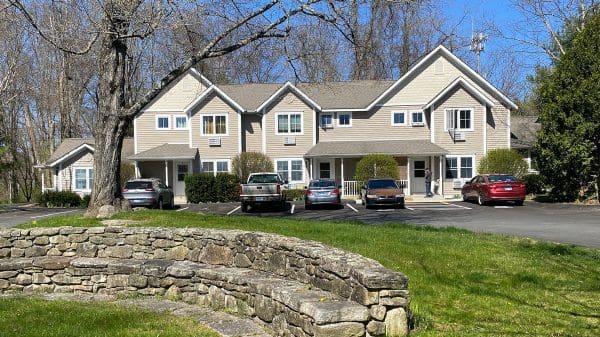The following article was produced as part of the Dispatch’s ongoing coverage of the upcoming election and its voter guide grant from the Rural News Network. The Rural News Network consists of 80 newsrooms, including The Kent Good Times Dispatch, serving rural communities across 47 states – a subset of the more than 450 members of the Institute for Nonprofit News (Inn) Network.
- Voter guide information will be published throughout October. Be sure to check back regularly and subscribe to our email list to receive updates.
- Election information for 2024, including sample ballot
- Republican state senate candidate for the 30th district
- Connecticut voters to decide on constitutional question
KENT—First-term state Senator Stephen Harding (R-30) and his challenger, political newcomer Justin Potter, faced off civilly in a debate Friday night, Oct. 18, that nevertheless underscored their differing opinions on public policy.

The debate was organized by the League of Women Voters of Litchfield County and was held at Lakeview High School, formerly Wamogo.
In his opening salvo, Potter said he is not a professional politician but entered the race because he is “frustrated with the cost of childcare, taxes, housing and everything else that goes into the cost of living.”
The son of a Washington, Conn., farmer and now a small businessman in Kent, he terms himself a “practical Democrat.”
“Growing up on a farm, I learned early that if you have a problem, you don’t complain, you get to work fixing it,” he said.
Harding, a conservative Republican, was born in New York City but grew up in and now resides in Brookfield. He said the greatest honor of his life is serving in the state senate and the most rewarding part of the job is making “a phone call and cutting through bureaucratic red tape” to assist his constituents.
The high cost of living in Litchfield County also motivates his political agenda.
“I see far too many young men and women leaving our state,” he said, “and far too many parents who would like to live near their grandchildren who can’t afford to live here.”
He is working to roll back recent dramatic increases in energy costs and to lower taxes. At the same time, he “believes in the natural beauty of the Northwest Corner” and backs open space preservation. He argues that the state government should not require high density housing development to promote affordable housing.
“It is for local towns to decide what they will develop, not bureaucrats in Hartford,” he declared. “I don’t support any law that dictates how much housing we have to have. The character and beauty of our communities are important. I have stood against high density of construction.”
On the other hand, Potter, president of Kent Affordable Housing, sees a pressing need for more construction.
“There’s so much we can do,” he argued. “We can make it easier to build affordable housing. We are eager to get the work done, but there are hurdles in the state bureaucracy, and we need to streamline it.”
“We have a housing crisis in Connecticut,” he continued. “I am very much in favor of assistance from the state to get housing built.”

Potter observed that Connecticut is facing a host of problems affecting the working class, other than affordable housing. He counts among them the high costs of childcare, utility costs, and food prices. He suggested that more funding for early education would relieve parents of “incredibly high childcare costs.”
Harding agreed that childcare is “one of the biggest bills we pay.” He suggested a childcare tax credit. “We should be looking at more tax credits for hardworking families,” he said.
Harding also wants a special session of the legislature to provide immediate relief from high electric bills. Potter said there are citizens coming to the Kent Food Bank that he never saw before the spike in electricity rates.
“The state should be able to figure out ways to provide stability, so residents are not hit with such huge spikes,” he said.
Both agreed that the Public Benefits portion of electric bills, which funds energy-related public policy programs, belongs in the state budget and not in the individual user’s bill.
A big part of Public Benefits (about 80 percent) results from the Millstone Nuclear Power Station bailout of 2017. That deal requires Eversource and United Illuminating to purchase power from the Millstone plant regardless of the cost of other fuels.
“Public Benefits has nothing to do with generation and should be part of the state budget. That is where it should be—not in your energy bill.”
—State senator Stephen Harding, R-30
“It was a lousy deal for Connecticut rate payers,” Potter said. “It provided for all of New England, but support of the plant is solely on Connecticut rate payers.”
Harding noted “this Republican voted against Millstone,” adding, “Public Benefits has nothing to do with generation and should be part of the state budget. That is where it should be—not in your energy bill. It is driving small business and rate payers out of state.”
He had dire warnings about investing in wind energy, predicting that the spikes in electricity costs would pale in comparison to wind procurement. “That is one of the biggest things I will fight in Hartford,” he vowed.
Wind energy procurement is the process of acquiring the materials, equipment and labor needed to complete a wind project. It can also refer to the process of sourcing renewable energy agreements.
Looking at the state of the economy, Potter said he would be a strong advocate for small businesses.
“Holy smoke, the hurdles there are,” he said. “There must be recognition that small business is fundamentally different than big business. They need to recognize that we don’t have deep pockets.”

Harding accused “the growing majority” [Democrats] of producing skyrocketing costs and taxes. “We should be doing everything to promote regulations to encourage businesses to grow,” he said.
In response to a question about undocumented immigrants, Potter said it is unfortunate that Republicans have “generally been vilifying that population.”
“We have to be careful, but we should also remember that these are human beings, many of whom are members of our communities,” he said. “We need a reasonable, compassionate policy when talking about the undocumented.”
Harding said, “Just as not every Democrat thinks the same way, not every Republican thinks the same way. We all have different feelings. In terms of undocumented immigrants, we have some significant expenses in the services we provide. Undocumented immigrants should be [regulated] at the federal level. It should not be state by state.”
He voted against the state’s Trust Act, which prohibits law enforcement officers from detaining someone solely on the basis of a Civil Immigration Detainer, saying “unless someone is committing a crime, a trooper can’t even speak to immigration personnel.”
“Holy smoke, the hurdles there are. There must be recognition that small business is fundamentally different than big business. They need to recognize that we don’t have deep pockets.”
—Justin Potter, candidate for 30th District state senatorial seat
Asked whether they support a Connecticut constitutional amendment to provide for equal protection from discrimination based on pregnancy, sexual orientation, gender identity and expression, Harding said he supported Roe v Wade and would support an amendment that reflects it. However, Harding voted against a 2022 reproductive bill, arguing he was concerned the legislation expanded “individuals that were able to perform asphyxiation abortions.” That portion of the bill had been removed.
Potter said he “absolutely would support” the constitutional amendment. “The fundamental problem is with the notion that women’s rights are states’ rights,” he said. “They are human rights.”
Asked if a person who was born a male should be allowed to play women’s sports, Harding said he “has trouble with that.”
Potter saw bigger issues on the table. “I am frustrated that attention is being paid to this divisive issue,” he said. “It distracts from so many of the things we need to do.”

























